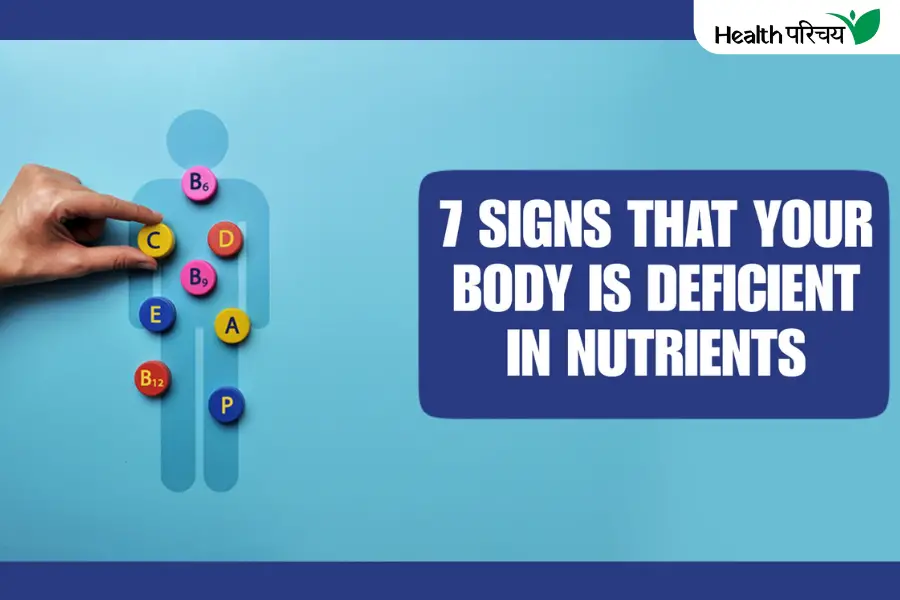Signs Of Nutrient Deficiency: In today’s fast-paced lifestyle, it’s easy to overlook the nutritional needs of your body. Poor dietary choices, stress, and modern living habits often lead to a deficiency of essential nutrients, impacting your physical and mental well-being. Your body sends signals when it’s lacking vital nutrients, but we often ignore these signs, mistaking them for minor inconveniences.
This blog highlights seven common signs of nutrient deficiency and offers actionable solutions to restore your health.

1. Persistent Fatigue and Low Energy
Feeling tired all the time despite getting enough sleep? This could be due to a deficiency in iron or vitamin B12, essential for energy production and oxygen transport in the body. Without these nutrients, your energy levels plummet, making daily tasks feel overwhelming.
Solution:
- Incorporate iron-rich foods like spinach, lentils, red meat, and fortified cereals.
- Add vitamin B12 sources like eggs, dairy, fish, and poultry.
- Stay hydrated and ensure 7–8 hours of quality sleep.
- Regular light exercises, such as walking or yoga, can also help boost energy levels.

2. Dry and Cracked Skin
Dry, flaky, or cracked skin, especially on your hands, lips, or feet, may indicate a lack of omega-3 fatty acids and vitamin E. These nutrients maintain the skin’s natural moisture barrier and elasticity.
Solution:
- Consume foods like fatty fish (salmon, mackerel), nuts, seeds, and avocados.
- Moisturize your skin daily with a quality moisturizer, particularly after bathing.
- Avoid long, hot showers, as they strip away the skin’s natural oils.
- Use sunscreen to protect against UV damage.

3. White Spots on Nails
Small white spots on nails can indicate a deficiency in zinc or calcium, both critical for nail health and strength.
Solution:
- Eat zinc-rich foods such as pumpkin seeds, chickpeas, and dairy products.
- Add calcium-rich options like milk, yogurt, broccoli, and tofu to your diet.
- Stay hydrated to improve nail health naturally.

4. Bleeding Gums
If your gums bleed easily while brushing or eating, it’s likely due to a vitamin C deficiency. Vitamin C supports gum health by aiding tissue repair and reducing inflammation.
Solution:
- Add vitamin C-rich foods such as oranges, lemons, strawberries, bell peppers, and spinach to your meals.
- Practice good oral hygiene by brushing twice a day and flossing regularly.
- Visit a dentist for regular checkups to prevent gum-related issues.

5. Frequent Mouth Ulcers or Throat Irritation
Mouth ulcers or a sore throat could point to a deficiency in vitamin B2, B3, or B6. These vitamins are essential for maintaining healthy tissues and a strong immune system.
Solution:
- Incorporate whole grains, leafy greens, bananas, nuts, and eggs into your diet.
- Avoid spicy and acidic foods that may aggravate ulcers or throat irritation.
- Gargle with warm salt water to soothe inflammation.
- Use alcohol-free mouthwash to protect sensitive areas.

6. Hair Loss and Brittle Hair
Hair fall and brittle strands may indicate low levels of zinc, biotin, or vitamin D. These nutrients strengthen hair follicles, prevent breakage, and promote healthy growth.
Solution:
- Include foods like nuts, seeds, eggs, fish, and fortified dairy products in your diet.
- Expose yourself to sunlight for natural vitamin D synthesis.
- Use mild shampoos and avoid overusing heat-styling tools.
- Consider taking biotin supplements after consulting a healthcare professional.

7. Frequent Headaches or Dizziness
Recurring headaches or dizziness could stem from a deficiency in magnesium, a mineral vital for nerve and muscle function. A lack of magnesium can also lead to muscle cramps and sleep disturbances.
Solution:
- Add magnesium-rich foods like bananas, almonds, dark chocolate, spinach, and beans to your meals.
- Stay hydrated and avoid excessive caffeine or alcohol intake.
- Try relaxation techniques like meditation or breathing exercises to reduce stress-induced headaches.
Also Read: 7 Warning Signs Your Tongue Is Telling You About Your Health
Why Nutritional Health Matters
Ignoring these warning signs can lead to chronic health issues. Simple dietary and lifestyle adjustments can prevent severe deficiencies, improving your overall well-being.
Image Credits: FREEPIK







Leave a Reply